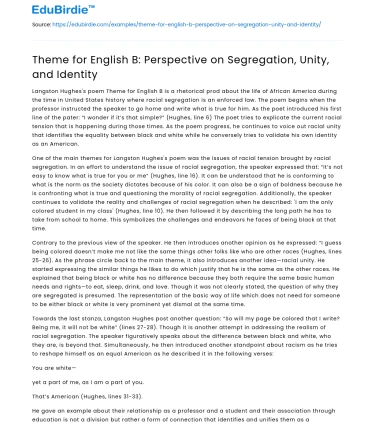Langston Hughes's poem Theme for English B is a rhetorical prod about the life of African America during the time in United States history where racial segregation is an enforced law. The poem begins when the professor instructed the speaker to go home and write what is true for him. As the poet introduced his first line of the pater: “I wonder if it’s that simple?” (Hughes, line 6) The poet tries to explicate the current racial tension that is happening during those times. As the poem progress, he continues to voice out racial unity that identifies the equality between black and white while he conversely tries to validate his own identity as an American.
One of the main themes for Langston Hughes's poem was the issues of racial tension brought by racial segregation. In an effort to understand the issue of racial segregation, the speaker expressed that: “it’s not easy to know what is true for you or me” (Hughes, line 16). It can be understood that he is conforming to what is the norm as the society dictates because of his color. It can also be a sign of boldness because he is confronting what is true and questioning the morality of racial segregation. Additionally, the speaker continues to validate the reality and challenges of racial segregation when he described: 'I am the only colored student in my class' (Hughes, line 10). He then followed it by describing the long path he has to take from school to home. This symbolizes the challenges and endeavors he faces of being black at that time.
Save your time!
We can take care of your essay
- Proper editing and formatting
- Free revision, title page, and bibliography
- Flexible prices and money-back guarantee
Contrary to the previous view of the speaker. He then introduces another opinion as he expressed: “I guess being colored doesn’t make me not like the same things other folks like who are other races (Hughes, lines 25-26). As the phrase circle back to the main theme, it also introduces another idea—racial unity. He started expressing the similar things he likes to do which justify that he is the same as the other races. He explained that being black or white has no difference because they both require the same basic human needs and rights—to eat, sleep, drink, and love. Though it was not clearly stated, the question of why they are segregated is presumed. The representation of the basic way of life which does not need for someone to be either black or white is very prominent yet dismal at the same time.
Towards the last stanza, Langston Hughes post another question: “So will my page be colored that I write? Being me, it will not be white” (lines 27-28). Though it is another attempt in addressing the realism of racial segregation. The speaker figuratively speaks about the difference between black and white, who they are, is beyond that. Simultaneously, he then introduced another standpoint about racism as he tries to reshape himself as an equal American as he described it in the following verses:
You are white—
yet a part of me, as I am a part of you.
That’s American (Hughes, lines 31-33).
He gave an example about their relationship as a professor and a student and their association through education is not a division but rather a form of connection that identifies and unifies them as an American, not as a different race. But because of the racial tension, Langston Hughes further explained it in this verse: “Sometimes perhaps you don’t want to be a part of me. Nor do I often want to be a part of you” (lines 34-35). As he continues to acknowledge the existence of the racial tension at that time. He also expresses his awareness about racial segregation as he goes on the last verse, “you’re older—and white—and somewhat more free” (Hughes, lines 39-40). The society places so much weight on the speaker. In addition to the challenges and unfairness brought by his color during those times. However, despite the reality of Langston Hughes's view of racial tension, he still has positive hopes and desires for racial unity and discovering his own American identity.






 Stuck on your essay?
Stuck on your essay?

